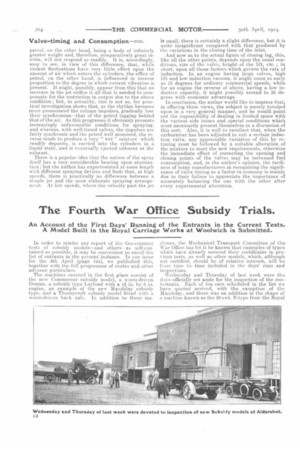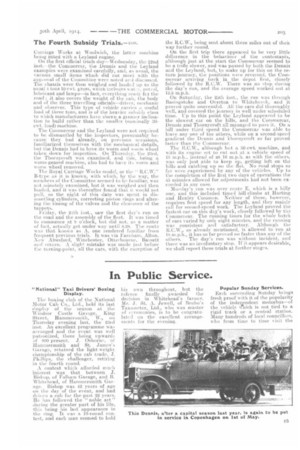The Fourth War Office Subsidy Trials.
Page 8

Page 9

If you've noticed an error in this article please click here to report it so we can fix it.
An Account of the First Days' Running of the Entrants in the Current Tests. A Model Built in the Royal Carriage Works at Woolwich is Submitted.
In order to render our report of the Government tests of subsidy models—and others—as self-contained as possible, it may be convenient to recall the list of entrants in the present instance. In our issue for the 5th April (page 144), we published this, together with the full programme of routes and other advance particulars.
The machines entered in the first place consist of the new Commercar subsidy model, a, worm-driven Dennis, a subsidy-type Leyland with a 4f in. by g.in, engine, an example of the new Maudslay subsidy type, and a Thornycroft subsidy model fitted with a. worm-driven back axle. In addition to these ma
chines, the Mechanical Transport Committee of the War Office has let it be known that examples of types which have already secured their certificates in previous tests, as well as other models, which, although not certified, should be of relative interest, will be frem time to time included in the days' runs and inspections.
Wednesday and Thursday of last week were the days officially set aside for the inspection of the contestants. Each of the cars scheduled in the list we have quoted arrived, with the exception of the Mandslay, and there was an addition in the shape of a machine known as the 30-cwt. R-type from the Royal
Carriage Works at Woolwich, the latte-ir machine being fitted with a Leyland engine.
On the first official trials day—Wednesday, the 22nd inst.-the Commercar, the Dennis and the Leyland examples were examined carefully, and, as usual, the various small items which did not meet with the approval of the Committee were noted and discussed. The chassis were then weighed and loaded up to the usuall tons 10 ewt. gross, watchuielui des v ate r, pet lubricant and lamps—in fact, everything ready fcr the road .; it also covers the weight of the cab, the body and of the three travelling officials—driver, mechanic and observer. This type of vehicle carries a useful load of three tone, and is of the heavier sided:1y class to which manufacturers have shown a greater inclination to build rather than the smaller (nominally 30cwt. -lead) niachine.
Thu Commercar and the Leyland were not required to be dismantled by the inspectors, presumably because they had already, on previous occasions, familiarized themselves with the mechanical details, but the Dennis had to have its worm and worm wheel taken down for inspection. On Thursday, the 2:3rd, the Thornyeroft was examined, and this, being a worm-geared maelline, also had to have it worm and worm wheel removed.
The Royal Carriage Works model, or the " R.C.W." B-type as it is known, with which, by the way, the members of the Committee seemed to be familiar, was nat minutely examined, but it was weighed and then loaded, and it was thereafter found that ii, would not pull, so the night of this date was spent in dismantling cylinders, correcting piston rings and altering the Liming of the valves and the clearance of the tappets.
Friday, the 21th inst., saw the first day's run on the road and the assembly of the fleet. It was timed to commence at 8 o'clock, but did not, as a matter of fad, actually get under way until 8.28. The route was that known as A, one rendered familiar from frequent previous trials. It was via .b•arnhatn, Alton. New Alresford, Winchester, Otterbourne, Bassett and return. A slighfr, mistake was made just 'before the turning-point, all the cars, with the exception of
the R.C.W., being sent about three miles out of their way further round.
On the first trip there appeared to be very little difference in the behaviour of the contestants, although just at the start the Commerear seemed to ho a trifle slower, and was passed by both the Dennis and the Leyland, but, to make up for this on the return journey, the positions were reversed, the Commercar arriving back in the depot first, closely followed by the R.C.W. There was no stop du r,:tig the day's run, and the average speed worked out at 13.5 m.p.h.
On Saturday, the 25th inst., the run was through Basingstoke and Overton to Whitchutch, and it proved quite uneventful. All the cars did thoroughly well, and covered the journey in well under scheduled time. Up to this point the Leyland appeared to be the slowest ear on the hills, and the Cemmerear, Dennis and Thornyeroft all managed to pass it. On .a hill under third speed the Commercar was able to leave any one of the ()there, while on a second-speed gradient the Dennis and Thornyeroft so far proved faster than the Commerear.
The R.C.W., although but a 30-ewt, machine, and with its engine set to cut out at a vehicle speed of 18 m.p.h., instead of at 16 m.p.h, as with the others, was only just able to keep up, getting left on the hills and catching tip on dm flat No road stops so far were experienced by any of the vehicles. tip to the completion of the first two days of operations the 45 minutes allowed for adjustments had not been exceeded in any ease.
Monday's run was over route E, which is a 'hilly ono, and this included timed hill-climbs at Harting and Henley Common. Neither of these, however, requires first speed For any length, and they mainly call for second-speed work. The Leyland proved the fastest car on this day's work, closely followed by the Commer ear. The running times for time whole batch of cars varied by only eight minutes, and the running was consistent and satisfactory. Although the B.C.W., as already mentioned, is allowed to run at Is m.p.h., it. has so far proved no faster than any of the others. The day's run was without incident, and there was no involuntary stop. IF it appears desirable, we shall report these trials at further stages.
























